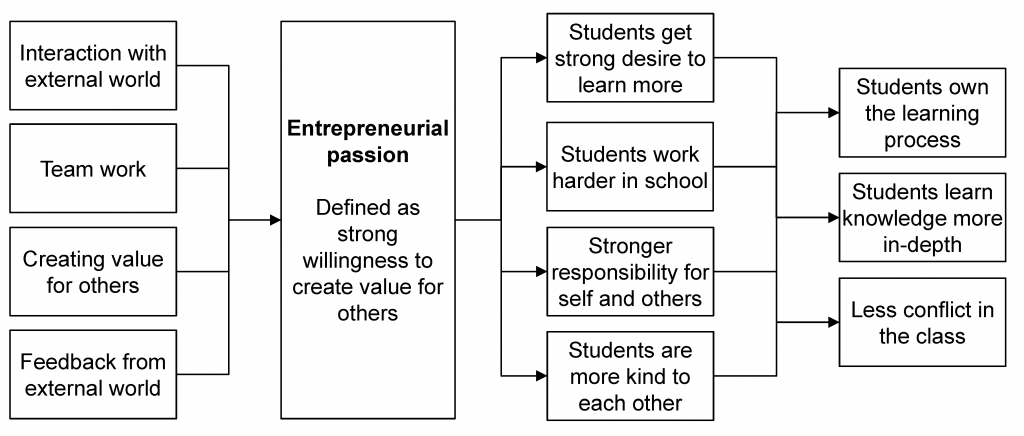This week we finished a report summarizing the results of our largest impact study so far in entrepreneurial education. It shows some absolutely fantastic results on student level. As the study was financed by National Agency of Education and a number of municipalities, the report is in Swedish. So I just thought I’d summarize the results here in English.
The study followed 481 students in 19 schools around Sweden, of age 8-17 years old. We used the LoopMe app to collect a total of 5895 mini-survey responses on important events in the students’ everyday school experience. Based on this, we selected 63 students for in-depth interviews, searching for links between emotional events and important learning outcomes. To complement the picture, we also interviewed 13 of their teachers, in the schools where the most interesting results were found.
The study showed strong impact of entrepreneurial education in many dimensions. The students got a much more meaningful everyday experience in school, their motivation increased significantly, they developed strong entrepreneurial passion (defined as willingness to create value for others), they strengthened their self-confidence and self-efficacy, they performed better in school and got better grades. The strong entrepreneurial passion resulted in a number of positive effects, such as deeper levels of learning achieved, more self-directed learning among students and fewer conflicts in class. For the teachers we could also see a number of changes. Their role as teachers was changed slightly, the assessment work was facilitated, assessment also became more inclusive. But the teachers also faced a number of new challenges, such as letting go of some of the control of what was going on in the classroom. See some effects in image below.
This study was made on a particular kind of entrepreneurial education: value creation education, see further in my PhD thesis here. Since we have done other impact studies on other kinds of entrepreneurial education, such as entrepreneurship education and enterprise education, we could also compare the impact of value creation education with the two other kinds of entrepreneurial education. This was thus the first time we could compare three rather different approaches to entrepreneurial education with each other. I will try to summarize the differences.
But first, some definitions. Entrepreneurial education was defined as learning about, for and through creating a venture (cf Gartner). Enterprise education was defined as letting students learn in teams by creating solutions to authentic problems and be more engaged and creative (cf Shane). Value creation education was defined as letting students learn by applying their existing and future competencies to create something preferably novel of value to at least one external stakeholder outside their group, class or school (cf Bruyat, see further in article linked here).
The comparison is shown in image below. We found that entrepreneurship education and value creation education gave a strong increase in motivation, and enterprise education gave a much weaker increase in motivation. Similarly, entrepreneurship education and value creation education resulted in strong development of entrepreneurial competencies, whereas enterprise education didn’t develop these competencies almost at all. On the other hand, entrepreneurship education did not develop school related knowledge and skills almost at all, due to its poor integration into the broad curriculum, which the other two kinds did very well. The kind of entrepreneurial education that gave the best impact in developing school knowledge and skills was value creation education. We could also see some apparent differences in cost of delivery, definitional clarity and possibility to start with minor activities.
I think these results are very interesting for the field of entrepreneurial education. They have numerous implications. It seems that the two widespread kinds of entrepreneurial education are either marginalized or irrelevant. Entrepreneurship education remains marginalized due to its inability to integrate with most kinds of non-business education. Enterprise education remains irrelevant due to its weak impact on entrepreneurial competencies and its vague state of being indistinguishable from the centuries-old and multifaceted approach labeled progressive education. I am now working on an abstract for the 3E conference in Cork next year (go there, it’s a great conference!), where I will ask my research colleagues what we should do about this situation of being caught between the Devil and the Deep Blue Sea (i.e. choosing between marginalization and irrelevance). I think we need to spend more resources on investigating other definitional starting points than the two usual ones of venture creation and opportunity identification. I have explored a third starting point of creating new value, and the results are simply stunning! The comparison perhaps seems too good to be true, but we have really struggled with getting teachers and students to articulate negative aspects of value creation education. The definitional confusion and difficulty in how-to of enterprise education is gone, and the difficulties to embed as well as the capitalist connotations of entrepreneurship education are also gone. We cannot rule out that we have stumbled upon something quite significant here…
Here is the report in Swedish if anyone wants and can read it: LINK. Maybe it’s Google Translate:able.











Fantastic!